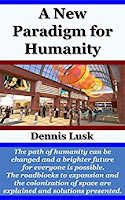A
New Paradigm for Humanity
Written by Dennis Lusk
A book review
By
Jim “Gymbeaux” Brown, February 12, 2018
I
have read a lot of books. What is a lot
to me? I have not kept a count but I
once did an inventory in the event my library was lost due to a hurricane like
Katrina which it almost was. I
inventoried well over 1000 books that I have read. Keeping count is much easier, if that is one’s
goal; since I now read all of them on Kindle.
So
when I tell you that I have never read a book quite like this one by Dennis
Lusk, it may have more meaning when you consider the number of books that I
have read. You can find it on Amazon at:
Lusk’s
book covers so much territory it is difficult to classify it. It is a history book, a political book, a
scientific book, and as important as those subjects are, it is probably most
notable as a futuristic book as Lusk uses all the books mentioned to project a
vision of a future for mankind as he conceptualizes that it good and maybe
should become. He makes a very valid
argument for his vision.
During
the first 30 to 40 percent of the book, I found myself agreeing with almost all
of Lusk’s views of the world up until today, 2018. Like it or not, he is right on the money. I say like it or not because some who begin to
read his book will probably stop because his thoughts of our world do not match
the reader’s. Instead of having an open
mind, their past and current political beliefs will stop them from seeing a
vision of mankind’s future that frankly I had never imagined like Lusk
obviously has. I would describe his
vision as his thesis of the future of mankind.
One of the definitions of “thesis” is a statement or theory that is put forward as a premise to be
maintained or proved.
I wrote a separate Nugget for the Noggin on
just one of the topics of this wonderful book, that of Thorium. If you have not read the previous Nugget on
the subject, you can find it on my blog at www.NuggetsfortheNoggin.com. It could very easily become the miracle
energy for the future of the world or at least it appears to be from a
non-scientific person/reader opinion.
As I read the book I was a bit overwhelmed by
some of the science described by Lusk in depicting how life could exist on our
Moon, satellites in orbit and on other planets.
I had no such difficulty in understanding why we should at least be
considering the possibilities of living on other planets/satellites. If you look at the millions years of Earth’s
history, you will discover as I have that there have been “incidents” that have
severely eliminated a great many life forms from our planet like the dinosaurs
and these incidents seem to have a time table of their own. One only need look at the Super Volcano at
Yellowstone National Park. It has
erupted approximately every 600,000 years with the last eruption taking place
about 640,000 years ago. The next
eruption will adversely affect our climate for an estimated 6 years with the
volcanic debris filling our atmosphere carried by the winds. That one event will wipe out millions of
humans, animals and plants world-wide.
There are several such Super Volcano sites around the Earth any one of which
could have the same result. Therefore
you do not have to have a scientific mind to understand that a world-wide
disaster can and eventually will happen.
If there is no alternative place to live, then what?
Lusk provides a great argument that we (you,
me, our governments) should be seriously considering a relocation of our
species and our plants and animals to other locations beginning with colonizing
our Moon. Frankly I had only briefly
thought of such a thing but not seriously at least until I read this book.
I would recommend this book to everyone. It is like reading a book on scientific
achievements that may well have been written by Gene Roddenberry of Star Trek fame and George Lucas of Star Wars fame except that that this is NOT about wars. On the contrary it is about extending
civilization without wars.
This is a book that will definitely make you
think and isn’t that what a good book is written to do? You may not agree with the conclusions of
Lusk but he will make you think and that is a good thing.
Who should read this book? I cannot think of anyone who would NOT benefit from reading it; therefore
everyone should read it. Would I buy
this book as gift? Absolutely. Would I read it again? Probably not but would I look through it for
something that interested me that I would like to read about again –
absolutely.






No comments:
Post a Comment